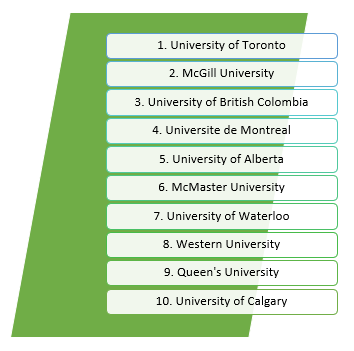As an international student various countries, courses and destinations are available to gain valuable education. One of the most common comparisons is between Canada and the United States. We will explore the reasons behind why Canada is becoming on of the top international study destinations of choice as opposed to the United States.
Quality of Education at Canadian Universities
Canadian universities have a well-recognized reputation for their quality of education around the world alongside the United States, England and Australia. The top ten universities in Canada for 2021 are:

Canada’s Visa Policy
International students account for most of the growth in enrolments in Canada throughout previous academic years.[1] From 2018/2019 to 2019/2020 there was an increase of 46,815 enrolments of international students at colleges and universities.[2] Due to COVID-19 and travel restrictions, it became more difficult for international students to travel for study in combination with the closure of Canadian educational institutions and cancellation of course. This resulted in a decrease in international student enrolments.[3] Despite this, the Canadian Government is working to provide international students with flexibility and options to continue their studies. One of the programs is the introduction of COVID-19 Co-op Work Permits.
The Canadian Government have created COVID-19 Co-op Work Permit Program for international students who are currently studying online from a different country due to various travel restrictions. If the educational institution and the employer agree, an international student can:
- Accept a remote Canadian work placement and begin to work remotely from their home country; or
- Work for a company in their home country
This program allows international students to gain valuable employment experience while continuing their studies.
Cost
Studying in the United States can be very costly and is on average from $37,430 to $48,510 each academic year.[4] This estimate does not account for additional costs to international students such as food, accommodation, airfares, and other expenses.
In Canada, undergraduate study programs cost an average of $33,623 in the 2021/2022 academic year and $20,120 each year for postgraduate study programs.[5] If you are interested in assessing the affordability of international study in Canada, EduCanada have developed a tool that allows you to find an educational institution and view the costs of tuition. Canada also offers several scholarships to international students that work to support those who may not be able to fund parts of their education. The EduCanada website provides a list of the scholarship opportunities available here.
Canadian Employment Opportunities
After graduating from postsecondary study, international students in Canada can apply for a Post-Graduation Work Permit (‘PGWP’) to extend their stay in Canada. A PGWP allows international students to gain employment experience and provides them with opportunities that may lead to permanent residency or citizenship. According to the Canadian Bureau for International Education, 60% of international students intend to apply for permanent residency after the completion of their study.
In the United States, there are very few if any options to remain in the country after having completed your studies. Usually, the student visa requires the visa holder to leave the United States within 60 days of their course completion.
Healthcare
As an international student, it is important that you have access to affordable healthcare. Canada provides universal healthcare to its permanent residents and citizens. International students do not usually have access to Canada’s universal healthcare system as they are classified as temporary residents. However, healthcare is also managed by individual Canadian provinces under which international students may be eligible.
| Province/Territory | Is healthcare coverage available to international students? | Requirements |
| Alberta | Yes | · Have a 12-month study permit at an Alberta higher education institution and will live in the province for 12 months or more
· Have a 3-to-12-month Alberta study permit and plan to live in the province for 12 months or more |
| British Colombia | Yes | · Have a 6-month study permit
· Coverage may commence three months after arrival date |
| Manitoba | No | |
| New Brunswick | Yes | · Must have a 12-month study permit |
| Newfoundland and Labrador | Yes | · Must have a 12-month study permit |
| Northwest Territories | Yes | · Must have a 12-month study permit |
| Nova Scotia | Yes | · International students must purchase health insurance
· Only eligible for Nova Scotia health insurance after a 12 month period if the student has not left the province for more than 31 days |
| Ontario | No | |
| Prince Edward Island (PEI) | Yes | · Must have a study permit that allows you to work off campus
· Must provide proof of full-time enrolment at a designated learning institution |
| Quebec | Depends | · Must be a recipient of a scholarship from the Ministere de L’Education du Quebec OR come from one of the countries that Quebec has a social security agreement with |
| Saskatchewan | Yes | · Must be studying for a t least 6 months |
| Yukon | No |
Travel Proximity
The benefit of studying in Canada is how close it is to the United States for travel. Canada and the United States are neighbouring countries, and you may be able to travel to the United States to explore the country. It is important that you check the requirements of your visa and whether you are permitted to travel. However, after finishing your studies in Canada, it may be possible for you to travel on to the United States.
References
[1] Statistics Canada, ‘Prior to COVID-19, international students accounted for the growth in postsecondary enrolments and graduates’, Online Website, November 24 2021 < https://www150.statcan.gc.ca/n1/daily-quotidien/211124/dq211124d-eng.htm?lnk=dai-quo&indid=7262-5&indgeo=0>.
[2] Ibid.
[3] Ibid.
[5] Statistics Canada, ‘Tuition Fees for Degree Programs, 2021/2022’, Online Website, September 8, 2021 < https://www150.statcan.gc.ca/n1/daily-quotidien/210908/dq210908a-eng.htm>.

Adriana Chipman
Juris Doctor (University of Melbourne)
Adriana is one of our immigration agent assistants. She graduated from the Juris Doctor at the University of Melbourne at the end of 2020. She is currently completing her Graduate Diploma in Practical Legal Training at Leo Cussen Centre for Law in Melbourne, Victoria.
With her experience in volunteering for not-for-profit organisations in addition to conducting legal research, drafting documents, and engaging with clients
Adriana works to assist our team in any and all administration matters relating to immigration.




Top in demand jobs in Canada for immigrants
Temporary Resident to Permanent Resident (TR to PR) Pathway Canada
How to Immigrate to Canada
Moving to Canada from the US
New Alberta Express Entry Stream – Accelerated Tech Pathway